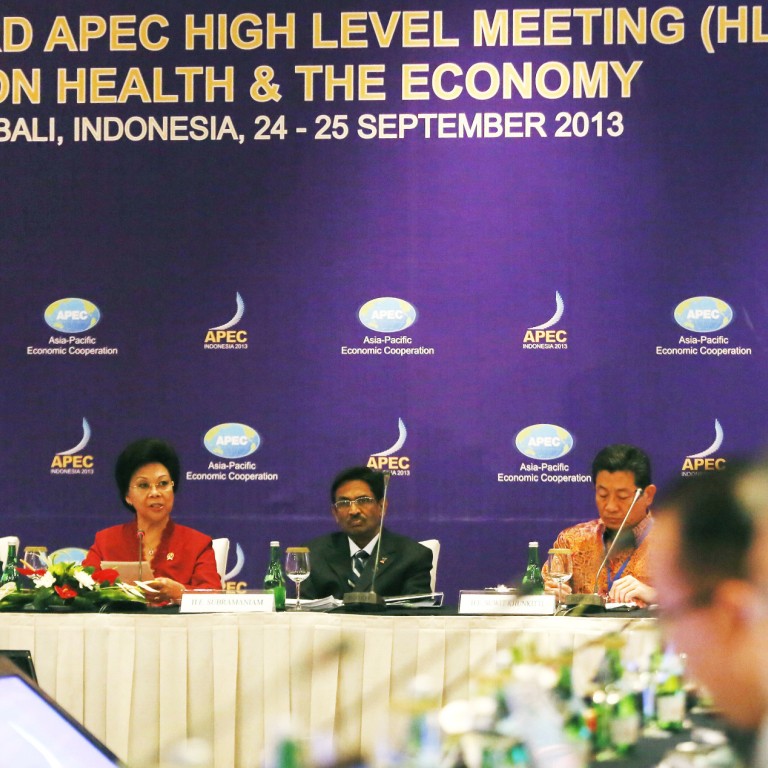
Apec can forge role at heart of region's economic integration
Zhang Jun calls for resolve to tap leadership potential by carrying out reforms and thinking big
Travellers in Bali are often asked two questions: where did you come from; and where are you going? This week, after almost two decades, the Apec economic leaders' meeting will return to Indonesia, the birthplace of the so-called Bogor Goals of free and open trade and investment in the region, set in 1994. This time, in Bali, the same questions will be raised for the Asia-Pacific Economic Co-operation forum.
Apec has evolved into a complex structure of meeting mechanisms involving leaders, ministers, senior officials, and government officials and experts from multiple committees and working groups. Its areas of co-operation have expanded beyond trade liberalisation and investment facilitation to include economic and technical co-operation, food and energy security, sustainable development and disaster relief, among others.
The Apec principle of consensus should be regarded as a great asset
Meanwhile, the lengthy list of jargon and acronyms has also been growing. This has kept the real business of Apec away from keen public interest.
Yet, despite this seeming distance from the public, the forum has maintained its relevance to the welfare and prosperity of the Asia-Pacific region.
This year, Apec's economic leaders will address three priorities put forward by the Indonesian host: attaining the Bogor Goals, achieving sustainable growth with equity, and promoting connectivity.
These priorities could not be more fitting in the context of the current global economic environment. Yet the question is: what role should Apec play in the debating and delivering of these priorities? What is the unique strength of Apec that leaders could leverage to define its future? In my view, the answer is in the realisation of the forum's leadership potential.
With member nations from diverse economic backgrounds, Apec is well positioned to encourage stronger macroeconomic policy co-ordination to reduce the risk of possible spillover effects. In the face of current uncertainties in the regional and global economy, particularly the challenges experienced by the emerging markets, such strong leadership is needed to ensure a sustainable economic recovery.
The region must strive to implement structural reform to shore up its economic resilience. Apec is the ideal platform to gather the will to enact these often challenging, costly and painstaking reforms.
This year's Apec meeting comes two months ahead of the World Trade Organisation's ministerial conference, also scheduled to be held in Bali, in December. Apec played an important role in facilitating the conclusion of the WTO's so-named Uruguay Round negotiation. Given the current trade protectionist sentiments, Apec leaders are expected to send out a strong signal to facilitate substantive results from the Doha Round of talks.
Progress achieved in regional free trade arrangements, such as the Regional Comprehensive Economic Partnership and the Trans-Pacific Partnership negotiations, will not compromise the need to uphold the integrity of the multilateral trading regime.
By tapping into its unique advantages of high-level participation, broad membership and expertise in economic and trade co-operation, Apec could pull together the strengths of member economies to maintain itself at the centre of the region's economic integration process and help avoid the fragmentation of free trade arrangements.
Apec's critics often point to its non-binding process and lack of a guarantee of implementation. While there is some truth to that view, it is essential to approach the matter from a different perspective.
The Apec principle of voluntarism and consensus should be regarded as a great asset, rather than a weakness. The freedom and flexibility embedded in such a principle not only mean that member economies from diverse cultural, economic and social backgrounds can work together comfortably, but also encourage innovative thinking and strategic vision, and offer leaders and thinkers the comfort to freely explore and experiment with cutting-edge ideas.
In the past, this principle has contributed to initiatives such as the environmental goods list and the Apec leaders' growth strategy. This principle has the potential to bring out the best in knowledge and collaboration that could define the regional and global economic co-operation landscape of tomorrow.
On postcards, Bali is famous for its beautiful rice terraces. But behind these stunning views lie an incredible amount of shared effort invested in the making and maintenance of those agricultural engineering marvels. To unlock Apec's potential to lead, partnership and collaboration are as essential as they are for the harvesting of rice.
In this sense, the Balinese setting could offer wisdom to the forum's leaders beyond this week. Next year, China will assume the Apec chairmanship. This will be a great opportunity to build on the achievements of Bali and take Apec to new levels of co-operation in regional economic integration, promoting connectivity and sustainable development. We are ready for it.

